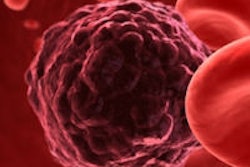
Antacid medicines help patients control their acid reflux. What if they also contributed to better overall survival rates in patients with head and neck squamous cell carcinoma (HNSCC)?
This provocative idea was explored in a new study in Cancer Prevention Research (December 2014, Vol. 7:12, pp. 1258-1269). Researchers found that HNSCC patients who took antacid medicines to control acid reflux had better overall survival.
 Silvana Papagerakis, MD, PhD. Image courtesy of the University of Michigan Health System.
Silvana Papagerakis, MD, PhD. Image courtesy of the University of Michigan Health System.Patients undergoing conventional cancer treatments such as chemotherapy and radiation often have acid reflux, but drugs used to combat acid reflux could actually help in other ways, researchers at the University of Michigan Comprehensive Cancer Center found. Often, to help treat this side effect, two types of antacids are prescribed: proton-pump inhibitors and histamine-2 blockers.
"While we had suspicions that these medications might have favorable secondary effects, our study suggests that they improve overall survival after treatment for HNSCC," said lead researcher Silvana Papagerakis, MD, PhD, in a statement. Dr. Papagerakis is a research assistant professor in the department of otolaryngology-head and neck surgery at the University of Michigan, Ann Arbor.
The researchers retrospectively analyzed data from 596 patients diagnosed with HNSCC at the University of Michigan from January 2003 to November 2007. All patients had received no prior treatment for HNSCC. Among the patients, 191 used only proton-pump inhibitors after diagnosis, 83 used only histamine receptor-2 antagonists, and 136 used both at some point after diagnosis.
“While we had suspicions that these medications might have favorable secondary effects, our study suggests that they improve overall survival after treatment for HNSCC.”
The analysis of overall survival after a median follow-up of 55 months took into account other variables, including age, smoking history, and treatment. The results, however, showed that patients with HNSCC taking a proton-pump inhibitor had a 45% decreased risk of death compared with those not taking a proton-pump inhibitor. Among those taking a histamine receptor-2 antagonist, risk of death dropped by 33%, compared with those not taking these acid reflux medicines.
"Moreover, histamine receptor-2 antagonists improved overall survival for patients with oral cavity cancer more than proton-pump inhibitors did," Dr. Papagerakis noted.
Although the association between treatment with histamine receptor-2 antagonists and overall survival was statistically significant when all types of histamine receptor-2 antagonist were considered together (p = 0.0479), the association was lost when each histamine receptor-2 antagonist was considered individually. For the proton-pump inhibitors, a statistically significant association with overall survival was seen for omeprazole and esomeprazole (p = 0.0008 and p = 0.001, respectively), a trend was seen for lansoprazole (p = 0.06), and no association was seen for pantoprazole (p = 0.67).
"We think that the different types of proton-pump inhibitors and histamine receptor-2 antagonists may affect survival of HNSCC patients through different mechanisms," Dr. Papagerakis concluded. The researchers are currently investigating this theory, and they cited a need for further studies to be able to design optimal prospective clinical trials.
Although the researchers saw differences in the degree to which overall survival was improved by proton-pump inhibitors and histamine receptor-2 antagonists, patients should not change their medications without consulting a physician, Dr. Papagerakis advised.
Dr. Papagerakis noted that validation of the results in randomized, prospective trials is needed before it is recommended that all patients with HNSCC be treated with acid reflux medication.
The study was supported by funds from the National Cancer Institute/National Institute of Dental and Craniofacial Research, the American Cancer Society, and the Undergraduate Research Opportunity Program at the University of Michigan, Ann Arbor.



















